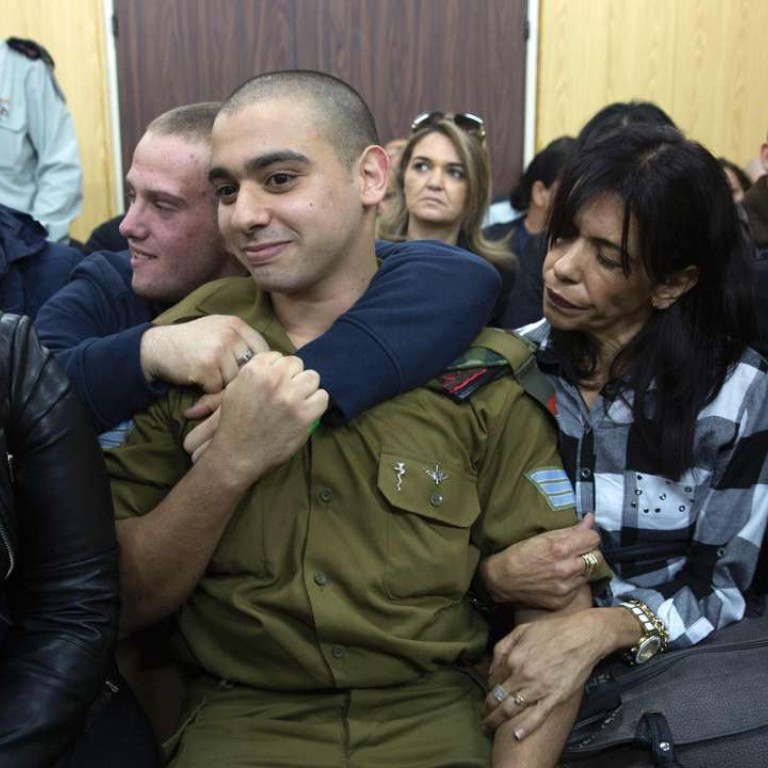
Israeli soldier found guilty of manslaughter after shooting wounded Palestinian
A military court ruled that Elor Azaria, who was 19 at the time, had acted outside the army’s rules of engagement when he killed Palestinian assailant Abdel Fattah al-Sharif
An Israeli soldier who killed a wounded Palestinian in the West Bank city of Hebron in March last year has been found guilty of manslaughter at the end of one of the country’s most polarising court cases in recent memory.
A military court sitting in Tel Aviv ruled that Sergeant Elor Azaria, who was 19 at the time, had acted outside the army’s rules of engagement when he killed Abdel Fattah al-Sharif, shortly after Sharif and another Palestinian had stabbed and wounded a solider at an Israeli military checkpoint.
The other Palestinian involved in the knife attack was shot and died immediately, but Sharif was alive when Azaria killed him. Accounts of the incident given by Azaria were “unreliable and problematic” and his defence contradictory and flawed, the court said.
Prosecutors had called for Azaria to be charged with murder but instead settled on a lesser charge of manslaughter, which carries a maximum sentence of 20 years. Sentencing is expected in about a month and Azaria is likely to appeal.
He had earlier arrived in court with his family, while supporters, including far-right fans of the Beitar football club, gathered outside. Scuffles erupted while the verdict was being read out.
The shooting on 24 March last year prompted international condemnation after being captured on video by a Palestinian human rights activist.

In the footage the wounded Sharif is surrounded by soldiers, medics and settlers. Azaria then appears and unslings a weapon before shooting Sharif in the head.
The discussion at the heart of the case was whether Azaria was justified in killing Sharif.
Presiding judge Maya Heller rejected the defence’s two central but contradictory claims, the first suggesting that Sharif was already dead at the time of the shooting, and the second that Azaria felt threatened, telling the court “you can’t have it both ways”.
Prosecutors had argued Azaria’s motive was expressed in comments witnesses said Azaria had made: that Sharif “deserved to die” for wounding a comrade. The court accepted this account, noting that the words carried “serious significance” in its ruling.
The rare case of an active serviceman being charged had been seen as a test of Israeli military justice.
It also exposed deep divisions in Israeli society, not only between left and right, but between the Israeli military’s most senior officers – who pushed for the prosecution – and nationalist political figures, who have campaigned for Azaria’s acquittal.
Earlier this week, the far-right Israeli education minister, Naftali Bennett, again called for Azaria to be acquitted, and failing that, to be immediately pardoned. On Tuesday, however, the Israeli military’s chief of staff pushed back at the most recent campaign slogan of Azaria’s supporters, which claims the soldier was “the child of us all”.

Speaking at a conference in Herziliya, Gen Gadi Eisenkot warned that the attempt to portray Azaria as immature and confused “undermines the most fundamental values that we look for in our soldiers”.
Among the acres of commentary in the Israeli media and on social media, perhaps most bizarre was the decision by Makor Rishon’s Profile magazine to declare Azaria one of its men of the year for “sparking the stormiest argument in Israeli society this year”, complete with a cover picture of the accused soldier posing with a gun.
On the right, the case has promoted the argument that soldiers and police should have no qualms about killing Palestinian attackers, and should face no consequences, while on the left it has raised questions about the impunity with which soldiers can shoot Palestinians.
Ahead of Wednesday’s verdict, Yesh Din, a leftwing NGO, released a report pointing to the “exceptionally low” prosecution rate of Israeli soldiers accused of violence by against Palestinians. Examining the 186 criminal investigations into suspected offences against Palestinians in 2015, it said only 21 of those cases generated investigations and that there were only four indictments.

